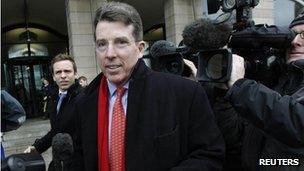How did the FSA calculate Barclays' fine?
- Published

Barclays chief executive Bob Diamond faces calls to resign
The Financial Services Authority (FSA) admits it cannot explain how it decided what to fine Barclays for attempting to manipulate interbank lending rates.
A source at the FSA has told the BBC that the figure was simply a "judgement call" by its enforcers.
It said there was no specific formula for deciding how much Barclays should pay.
The FSA also admitted that its approach to coming up with fines is "opaque".
The topic of the FSA's formula for assessing fines is such a sensitive topic, few people want to speak about it - much less be quoted on the record discussing it.
The <link> <caption>FSA fined Barclays £59.5m</caption> <url href="http://www.bbc.co.uk/news/business-18612279" platform="highweb"/> </link> ($93m) for attempting to manipulate the London Interbank Offered Rate (Libor) and the Euro Interbank Offered Rate (Euribor), two interest rates banks use when lending to one another.
On top of that the US regulator, the Commodity Futures Trading Commission (CFTC), levied a fine of $200m (£128.5m) on Barclays, the biggest fine it has ever issued.
The fraud department of the US Justice Department's Criminal Division levied a $160m (£103m) penalty to Barclays "in a related manner".
A director of one prominent shareholder interest group, who declined to be named, said that while the FSA fine was modest in comparison with that of the CFTC, shareholders "would not want it to be any larger as this would impact on future dividends."
The director added that the FSA and CFTC fines combined amounted to almost half of the total dividends paid by Barclays last year.
On the other hand, the FSA fine is equivalent to not more than about ten days' of profit for Barclays.
Critics argue the FSA's £59.5m fine is too small to reflect the seriousness of the misconduct.
Setting the tariff
So how did the FSA decide what was an appropriate fine?
The regulator said that Barclays' conduct contravened three of its principles by which all regulated companies must abide.
But it does not prescribe a specific cost to members for contravening them.
The <link> <caption>FSA's handbook </caption> <url href="http://www.fsa.gov.uk/handbook/" platform="highweb"/> </link> sets out its procedure for setting fines, including five steps for penalties imposed on regulated firms.
In setting fines the FSA establishes a figure "that reflects the seriousness of the breach," commonly the amount of revenue a firm generates from the part of its business involved in the case.
It then decides on a percentage of that figure to be the value of the fine.
Where there is not an appropriate figure to hand, or a way to determine the value of any potential damage arising from the violation, it "will use an appropriate alternative".
But the FSA source told the BBC that, in the Barclays case, no alternative figure was generated.
"It is basically a judgement call - no alternative figure was used," the source said.
The regulator's handbook states that the amount of revenue generated by a firm from a particular product or business area " <link> <caption>is relevant in terms of the size of the financial penalty necessary to act as a credible deterrent</caption> <url href="https://fsahandbook.info/FSA/print/handbook/DEPP/6/5B" platform="highweb"/> </link> ."
But it could not explain how the fine levied relates to either the potential harm caused or the size of the division in question.
While fines levied by the CFTC are paid in full to the US Treasury, the FSA keeps the money to reduce the fees members (except the member who the fine is awarded to) pay it to be regulated.
The FSA source said that its fine "could not be compared like for like" with that of the CFTC because they come from different regulatory regimes.
The FSA is to be superseded by the Financial Conduct Authority (FCA) at the end of 2012 or the start of 2013.
The BBC's source at the regulator says that it does not anticipate any change to the way it works out the size of fines.
But in a speech to Parliament, chancellor George Osborne hinted at the possibility for criminal proceedings to be brought against individuals involved in the attempted manipulation of interbank rates.
HSBC, RBS, Citigroup and UBS are under investigation for colluding in the attempted manipulation.
If the size of fines reflects the seriousness of the transgression, the incoming FCA may need to examine its US counterparts' harsher response to such astounding governance failures.
It has some time to do so. The BBC has been given to understand that the FSA believes it will take "months" before the next settlement with a bank over Libor manipulation will be announced.
- Published28 June 2012
- Published21 May 2012
- Published3 April 2012